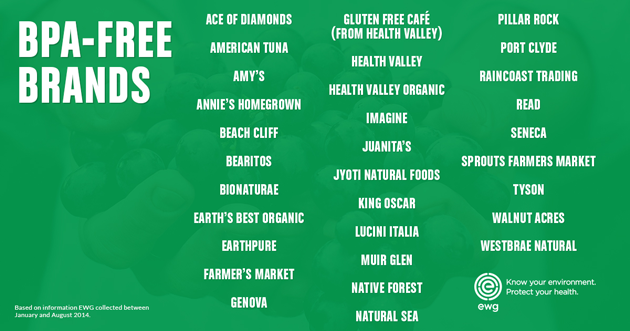Obviously we’d like companies like Campbell’s to choose healthier, organic, more plant-basedcampbells s ingredients. But for the rest of the world who will continue to eat these products, a place to start is to let people know what’s in their canned foods, and how to help get rid of the toxic and dangerous chemicals in things as seemingly innocuous as their child’s can of tomato soup.
Tonight, Wednesday March 30 at midnight, an important report will be released by six nonprofit organizations on ToxicFoodCans.org that analyzed the interior linings and lids of nearly 200 canned foods for the presence of Bisphenol A (BPA) and the replacement materials for BPA-based epoxy being used by national brands and retailers, and the extent to which those companies have studied the safety of these materials. Evidence suggests BPA may contribute to a host of harmful health effects including breast and prostate cancer, infertility, type-2 diabetes, obesity, asthma and attention deficit disorder.
Upon learning about the upcoming report, Campbell’s announced yesterday they are eliminating BPA in North American cans by mid- 2017. While this is a step in the right direction, the statement left out important details that we think would make this truly good news for Campbell’s soup lovers:
How do we know they will follow through? Four years ago Campbell’s made a similar promise, yet the report to be released tomorrow found otherwise.
Not everyone benefits from their plan. They did not indicate a timeframe for global phase-out of BPA. Campbell’s sells in 120 countries around the world, and should make a commitment to making the safest cans possible everywhere they do business.
Consumers are left waiting and wondering. They did not mention plans to label cans that are lined with toxic BPA during the phase out. The report that will be released tomorrow will show why this is important to consumers today.
Publicly disclosing the safety of their BPA alternatives is a critically important request from a business and public health perspective. Consumers want BPA-free food cans that are truly safer, not food cans lined with BPA-alternative chemicals that may be equally or even more toxic. Tomorrow’s report will also highlight the importance of informed substitution and whether BPA Free means safe.
They did not adopt a formal safe packaging chemical policy. This would guide Campbell’s review and safe substitution of other chemicals of concern in their food packaging. By doing so, Campbell’s would communicate to the public their commitment to addressing the larger problem of unsafe chemicals in food packaging and continuous improvement.
Campbell’s website already identifies products that are GMO-free or free of high fructose corn syrup or MSG. The need for disclosure on packaging and online is consistent with the growing demand for greater transparency and consumer-right-to-know in the food and consumer products arena.
The Breast Cancer Fund is the leading national organization working to prevent breast cancer by eliminating our exposure to toxic chemicals linked to the disease. As part of their Cans not Cancer Campaign, is committed to supporting actionable plans that live up to the promise of protecting public health from exposure to toxic chemicals like BPA in food packaging. While it is understandable that Campbell’s wants to assure its consumers in advance of our report, it does not change what is on the shelves now nor does it guarantee the future safety of their cans. We encourage Campbell’s to put a more robust action plan into place and be held accountable for their commitments.






